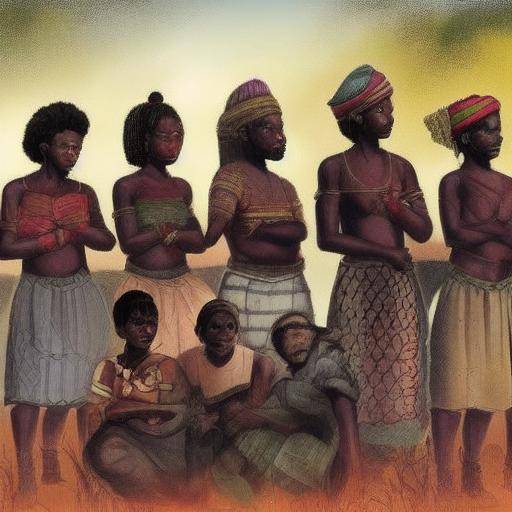
The griots are prominent figures in African tradition, especially in West Africa, which play a crucial role as guardians of oral history. Throughout the centuries, the history, culture and traditions of their communities have been transmitted from generation to generation through narratives, music and poetry. In this article, we will explore in depth the meaning and importance of the griots, their relationship with oral tradition and their roots in the rich history of West Africa. In addition, we will analyze its evolution over time, its contemporary relevance and the impact they have had on the preservation of African heritage.
Introduction to Griots
In African societies, griots are regarded as the depositaries of collective memory, responsible for preserving and transmitting the history, culture and values of their communities through oral accounts, music and poetry. Their role goes beyond being mere narrators, as they are also singers, poets and musicians who use their artistic skills to spread accumulated knowledge over generations. The griots are highly respected figures and their presence is fundamental in community events, ritual ceremonies and celebrations.
History and Background of the Griots
The griots have their roots in the ancient African oral tradition, which dates back centuries. Since time immemorial, the communities of West Africa have trusted the griots to preserve the history and wisdom of their peoples. These teachers of narrative and music have played a crucial role in the transmission of knowledge, conflict resolution and the preservation of cultural identity over time.
The first references to griots date back to the Empire of Ghana in the seventh century, where they performed both religious and entertainment functions. Over the centuries, its influence expanded to other empires in the region, such as the Malian Empire and the Songhay Empire, consolidating its role as custodians of collective memory. Throughout history, griots have exerted a significant influence on West African culture, politics and society.
Importance and Meaning of Griots
The importance of griots lies in their ability to preserve the history and culture of their communities through oral transmission. His ability to narrate stories, recite poetry and chant traditional music has allowed the rich African heritage to perish over time. Furthermore, griots have been guardians of cultural identity, transmitting ancestral values, traditions and knowledge that have forged the collective identity of African societies.
The work of the griots transcends the simple historical narratives, as their presence in social and ceremonial events brings a spiritual and emotional component to the celebrations. Through their art, the griots have nurtured the sense of belonging and cohesion in their communities, strengthening social ties and preserving the cultural uniqueness of West Africa.
Griots have also played an important role in conflict resolution and the transmission of ethical and moral values. Their wisdom and ability to mediate in disputes have helped to maintain harmony and stability within communities. Its influence has also transcended geographical boundaries, being recognized as cultural ambassadors of West Africa in the global field.
The Contemporary Evolution of the Griots
Although the tradition of griots dates back to ancient times, its relevance today remains significant. Despite the challenges they have faced, such as the influence of writing and globalization, griots have managed to adapt to changes and preserve their cultural legacy. In the digital era, manygriots have used online platforms and multimedia productions to continue spreading their narratives, music and poetry, reaching global audiences and perpetuating their ancestral legacy.
The Oral Tradition and its Link with the Griots
Oral tradition represents an invaluable heritage for African societies, and griots are their faithful custodians. Through orality, knowledge, myths, legends, genealogies and stories connecting the past with the present, as well as the generations present with the future, are transmitted. Oral tradition sustains the collective memory of the peoples and constitutes a unique means of cultural expression that has endured over time.
The role of griots as narrators and preservers of oral tradition is fundamental to understanding and appreciating the cultural wealth of West Africa. Its ability to merge narrative, music and poetry into performing art has enriched the transmission of knowledge and traditions, keeping alive the historical and cultural essence of African communities.
The Deep Link with West Africa
West Africa stands as a crucible of ancient cultures, languages and traditions, and griots are a significant manifestation of this rich legacy. Its presence is palpable in various nations of the region, from Senegal and Mali to Guinea and the Gambia, and its influence extends across geographical borders. The presence and legacy of the griots have transcended time and space, transcending geographical reality and becoming an indissoluble part of the very identity of West Africa.
The music, poetry and narratives of the griots encapsulate the cultural and linguistic diversity of the region, representing a bridge between different ethnic groups and communities. Its ability to transmit multi-ethnic and multilingual narratives reflects the wealth and complexity of West African societies, underlining the indelible value of their cultural heritage.
Conclusions and prospects Futures
The griots have remained tireless guardians of African oral tradition, preserving history, culture and traditions over the centuries. Its influence transcends geographical and temporal borders, consolidating its role as cultural ambassadors in West Africa.
The legacy of griots persists as an inexhaustible source of wisdom and cultural enrichment, invoking a deep sense of identity and belonging in African societies. As the world moves towards an increasingly interconnected future, the work of the griots remains essential for preserving cultural diversity and promoting intercultural understanding.
In short, griots represent a living embodiment of oral tradition, the rich cultural heritage of West Africa and the depth of shared knowledge through generations. His legacy endures as an eternal tribute to the resilience, creativity and the very essence of African societies.
